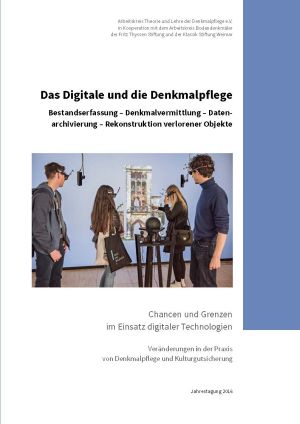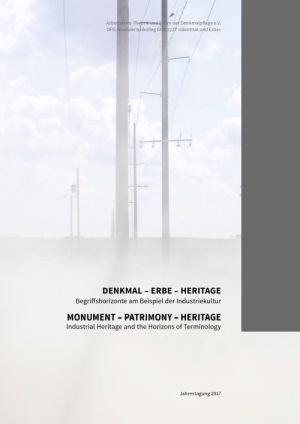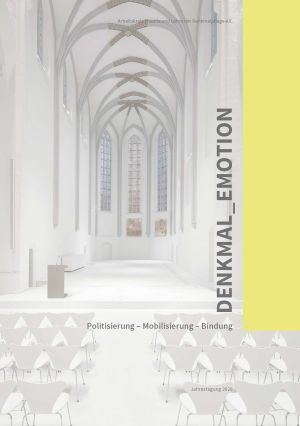Franz, Birgit
Das Digitale und die Denkmalpflege: Bestandserfassung – Denkmalvermittlung – Datenarchivierung – Rekonstruktion verlorener Objekte
The ‘digital revolution’ is now in full swing. For heritage conservation, digital tools have opened new perspectives, finding application in the interactive visualization of past situations, the monitoring of threatened sites and artefacts, or the complex cross-referencing of heterogeneous collections of knowledge. At the same time, the limits and unsolved problems associated with using digital technologies are also becoming more apparent, for example with regard to maintaining the rapidly-growing volumes of data being generated.
And yet with digitization, we are not dealing primarily with a ‘technical’ innovation. Thus the effort to conserve digital heritage, including documenting, researching and publishing cultural assets, will transform more than just the institution of the museum. The new abundance of digitally-generated images can also be seen to be changing the standards of the scientific and academic discipline. A further and as yet underappreciated aspect of the digital revolution is the way it is rearranging the foci of attention in the knowledge ‘market’.
Perhaps the most noticeable consequence of digitization’s promise of exact and comprehensive reproduction is the knee-jerk insistence, following every instance of the spectacular destruction of a famous monument, on creating a reconstruction. Here it is clear that an affinity for reconstruction is inherent in the digital, to the extent that its primary feature is its capacity to translate all information into binary code, to capture and copy exactly, supposedly without loss of detail. In the digital age, the distinction between original and copy will therefore lose relevance – at the cost of a total manipulability of data, and of reality.
Denkmal – Erbe – Heritage: Begriffshorizonte am Beispiel der Industriekultur
This Volume offers two languages (german/english)
If “Sharing Heritage” is to be taken seriously, then it must have consequences for the assessment of value – in Europe, but also beyond: in place of the more exclusionary “World Heritage”, which tends to foreground each country's own, often nationally-defined achievements and merits, we should strive toward the creation of a “Global Heritage,” one capable of building bridges on the basis of universal values, thereby bringing the world’s people closer together as a global community with a common destiny.
The 2017 Annual Meeting of the Working Group on Theory and Education in Heritage Conservation on the topic “Monument – Patrimony – Heritage” at the TU Berlin was at the same time the first Annual Meeting of the Research Training Group 2227 “Identity and Heritage” (GRK 2227), funded by the DFG. A cooperation between the two was particularly opportune, as the Working Group had decided on Berlin as the location of the annual meeting and, in view of the motto “Sharing Heritage” of the European Cultural Heritage Year 2018, to dedicate it to a discussion of monument and heritage terminology, while the Research Training Group, with seats in Berlin and Weimar, had been launched to address such questions and a number of colleagues are active in both bodies.
Denkmal_Emotion: Politisierung – Mobilisierung – Bindung
The "emotional turn", it seems, has meanwhile arrived in the field of Heritage Studies. The connection between emotions and heritage/monuments can be regarded as a reciprocal and interdependent relationship. Understood as an integral part of processes of individual and collective meaning-making, emotions are being reconceived as a formative aspect of valorization, appropriation and rejection rather than their mere by-product, and as such are being recognized as constitutive for the field of heritage conservation. The essays gathered here reflect in their range the different facets of the complex relationship between Heritage Studies and emotions, be it in relation to the political dimensions of that relationship, to the development of new emotional points of reference or to very concrete processes of the appropriation or rejection of heritage.









